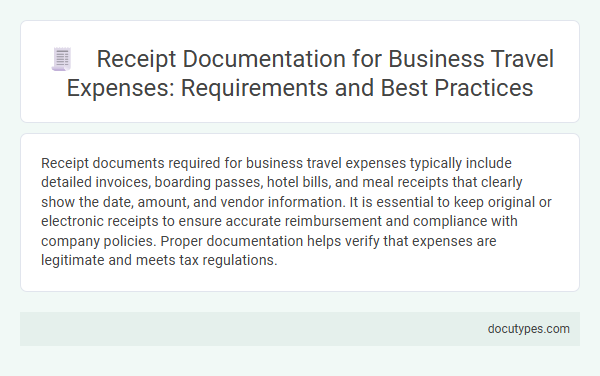Receipt documents required for business travel expenses typically include detailed invoices, boarding passes, hotel bills, and meal receipts that clearly show the date, amount, and vendor information. It is essential to keep original or electronic receipts to ensure accurate reimbursement and compliance with company policies. Proper documentation helps verify that expenses are legitimate and meets tax regulations.
Importance of Accurate Receipt Documentation for Business Travel
Receipts for business travel expenses must include detailed documentation such as airfare, lodging, meals, transportation, and incidental costs. Accurate receipt documentation ensures compliance with company policies and tax regulations.
Properly organized receipts provide clear evidence of business-related expenses, facilitating smooth reimbursement and auditing processes. Missing or incomplete receipts can lead to denied claims or financial discrepancies. You play a crucial role in maintaining thorough and precise records for each travel transaction.
Essential Requirements for Business Travel Receipts
| Essential Requirements for Business Travel Receipts | |
|---|---|
| Detailed Expense Description | Receipts must clearly indicate the nature of the expense, such as transportation, lodging, meals, or incidentals. |
| Date of Purchase | The receipt must display the exact date when the expense occurred to align with the travel period. |
| Vendor Information | Receipts should include the name and contact details of the vendor or service provider. |
| Amount Paid | The total amount charged, including taxes and tips if applicable, must be clearly visible on the receipt. |
| Proof of Payment | A valid receipt must confirm payment was made, whether by credit card, cash, or other methods. |
| Original Receipts Preferred | Paper or electronic original receipts are typically required rather than handwritten notes or photographs. |
| Compliance with Company Policy | Your receipts should meet your organization's guidelines for allowable expenses and documentation standards. |
Types of Acceptable Receipts for Business Expenses
Receipts required for business travel expenses include detailed documentation of transportation, lodging, meals, and incidental costs. Acceptable receipts must clearly display the date, vendor name, amount paid, and description of the service or product. Common types include airline tickets, hotel invoices, restaurant bills, taxi or rideshare receipts, and parking or toll receipts.
Key Information Every Receipt Should Include
Receipts for business travel expenses must clearly show the date, vendor name, and amount paid. These details verify the legitimacy and accuracy of your expense report.
Key information every receipt should include are the itemized list of purchases, payment method, and currency used. Having these elements ensures compliance with company and tax regulations.
Digital vs. Paper Receipts: Pros, Cons, and Compliance
Business travel expenses require accurate receipt documentation to ensure proper reimbursement and tax compliance. Both digital and paper receipts serve as proof of incurred costs during business trips.
Digital receipts offer convenience by allowing easy storage and quick retrieval through mobile apps or email. They reduce the risk of loss and simplify expense tracking but may face challenges with acceptance by certain tax authorities.
Paper receipts remain widely accepted and provide tangible proof for auditors during expense verification. However, they are prone to damage or loss and require physical storage space, which can complicate record-keeping.
Compliance regulations for business travel expenses mandate that receipts include essential details like vendor name, date, and amount. Ensuring receipts meet these requirements is critical regardless of the format used to avoid reimbursement issues or tax penalties.
Handling Lost or Missing Receipts: Recommended Procedures
What are the recommended procedures for handling lost or missing receipts during business travel? Businesses should maintain a clear policy requiring employees to promptly report lost or missing receipts. Employees may be asked to provide alternative proof of the expense, such as credit card statements or electronic invoices, to support reimbursement claims.
Best Practices for Submitting Travel Expense Receipts
Receipts are essential for documenting business travel expenses accurately. Proper submission of these receipts ensures compliance with company policies and tax regulations.
- Itemized Receipts - Provide detailed information including date, vendor, and amount to verify each expense.
- Original Receipts - Submit physical or digital copies of original receipts to avoid disputes during expense audits.
- Timely Submission - Upload receipts as soon as possible after travel to streamline reimbursement and record-keeping processes.
Your adherence to these best practices will facilitate smooth processing and approval of your travel expense claims.
Organizing and Storing Receipts for Audit Readiness
Organizing and storing receipts accurately is essential for maintaining audit readiness in business travel expenses. Proper documentation supports compliance and simplifies expense verification by finance departments.
- Collect original receipts - Ensure all travel-related expenses are backed by original receipts to validate costs incurred during business trips.
- Use digital storage solutions - Scan and store receipts electronically to enhance accessibility and reduce the risk of physical loss or damage.
- Maintain clear categorization - Organize receipts by date, expense type, and trip to streamline the audit process and facilitate quick reference.
Common Mistakes in Receipt Documentation and How to Avoid Them
Accurate receipt documentation is essential for business travel expense reimbursement and tax compliance. Common mistakes in managing these receipts can lead to delays or denial of claims.
- Missing Itemized Details - Receipts lacking itemized lists make it difficult to verify expenses and may be rejected by accounting departments.
- Illegible Receipts - Poor quality or faded receipts reduce clarity and can result in non-compliance with company policies.
- Incomplete Date or Vendor Information - Receipts without clear dates or vendor names undermine the validity of the expense claim and cause processing issues.
What Receipt Documents Are Required for Business Travel Expenses? Infographic

